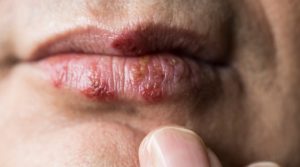Herpes is a sexually transmitted infection (STI) affecting millions worldwide. It’s an uncomfortable topic to discuss, but it’s important to understand the basics of herpes and how you can protect yourself from getting infected. In this post, we will dive deep into the world of herpes, covering everything from what it is to the different types of herpes, how you can contract herpes, and what symptoms to look out for. We will also discuss the various treatment options available, as well as some natural remedies that may help manage outbreaks. Lastly, we will share some preventative tips to help you avoid contracting herpes and ways to manage it if you do get infected.
What is Herpes?

Herpes is a sexually transmitted infection caused by the herpes simplex virus. There are two types of herpes – genital herpes and oral herpes (cold sores). Herpes is extremely common, with more than half of the population having oral herpes and about 1 in 6 people having genital herpes. Most people with herpes are asymptomatic and do not realize they have it.
However, when outbreaks do occur, they can cause painful blisters or sores on the genitals, mouth, or other parts of the body. Herpes does not usually lead to serious health problems, although the virus can be transmitted to others during an outbreak. Safe sex practices can help reduce the risk of contracting or transmitting herpes.
Types of Herpes

Herpes is a common viral infection caused by the herpes simplex virus (HSV), which is divided into two types – HSV I and HSV II. HSV-1 is usually responsible for oral herpes, while HSV-2 is responsible for genital herpes. HSV-2 causes most cases of genital herpes. More than half of Americans have oral herpes, and about 1 out of 6 Americans have genital herpes. HSV-1 and HSV-2 can cause outbreaks of painful blisters or sores.
Herpes is transmitted through direct contact with an infected person or by sharing eating utensils, razors, or towels. Condoms can reduce the risk of transmission but not entirely. While there is no cure for herpes, antiviral drugs can help reduce the frequency and severity of outbreaks.
How Do You Get Herpes?

Herpes is an infection caused by the Herpes Simplex Virus (HSV). The virus is transmitted through contact with an infected person’s saliva or bodily fluids. It can also be passed via skin-to-skin contacts, such as when a person has a cold sore. As the name suggests, herpes affects the skin and mucous membranes, but it can also affect other organs and tissues in the body.
The virus may be latent (not causing symptoms) or active (causing visible symptoms). When it is active, the virus lies dormant in the sensory nerve ganglia, located on the dorsal root and sacral nerve ganglia. These areas send signals to various parts of the body to regulate functions like muscle movement, eye movements, and sense of touch. The virus may become active once again in some individuals as they reach their late teens to early 20s due to hormonal changes. This is why many people between the ages of 16 and 21 are more prone to contracting genital herpes.
Herpes can be transmitted through direct skin-to-skin contact with open lesions, sexual activity with an infected partner, or even childbirth. If you have been diagnosed with genital herpes and would like to know how you got it or how you can prevent future transmission, you should see a doctor for proper treatment. In some cases, medications can help control outbreaks and reduce the risk of transmission.
Symptoms of Herpes

Several symptoms of herpes can be seen in various parts of the body, including the mouth, genital area, and skin. These include blisters filled with fluid or pus, itching, redness, and sensitivity to touch. If the symptoms are severe or go untreated, they may lead to serious health complications such as loss of vision, inflamed nerves, or even death. It is essential to seek medical help as soon as possible if you notice any unusual symptoms.
Herpes can be prevented by using a herpes vaccine. A person can also reduce the risk of contracting herpes by practising safe sex and knowing their sexual history. Suppose a person already has the herpes virus. In that case, they should take proper medication as prescribed by a doctor to speed up the healing process and eliminate any signs of spreading it further.
Treatment Options for Herpes

Herpes is a common viral infection that is typically spread through sexual contact. This infection can cause symptoms such as painful blisters or sores, itching, and fever. While there is no cure for herpes, several treatment options are available for both oral and genital herpes.
Antiviral medications like acyclovir and valacyclovir can speed up healing and reduce pain for many people with herpes. Prescription medication can also provide relief from symptoms and lower the chances of passing the virus on to others. Infected areas should be kept clean and dry, and applying an ice pack wrapped in a towel can help reduce the pain.
Managing stress, getting enough rest and exercise, and maintaining a healthy diet are all crucial ways to support your overall health when dealing with herpes. There is no need to panic if you have herpes – with the proper treatment and care, it is possible to live a healthy and happy life.
Prevention Tips to Avoid Contracting Herpes

There are a few prevention tips to avoid contracting herpes that everyone should know. Herpes is a highly contagious virus that can be passed on through skin-to-skin contact, sexual intercourse, and sharing contaminated items such as utensils or towels. The virus can remain inactive in the body for long periods of time, only to resurface when triggered by stress or other illness.
The best way to prevent contracting herpes is to abstain from any type of sexual contact with someone who has the virus. If you must engage in sexual activity, always use a condom. It’s also important to avoid sharing items such as towels, razors, or lip balm with someone who has herpes.
Suppose you think you may have contracted herpes. In that case, it’s important to see a doctor immediately, as treatments available can help lessen the symptoms and shorten the duration of an outbreak.
Alternatives to Managing Herpes

There are many ways to manage herpes. Some people choose to do nothing and live with the virus. Others take medication to control outbreaks. And still, others use natural methods to lessen symptoms and shorten healing time.
If you have herpes, you’re not alone. According to the Centers for Disease Control and Prevention, about one in eight people in the United States has the virus. And while there is no cure, there are ways to manage it.
Medication: If you experience frequent or severe herpes outbreaks, your doctor may prescribe antiviral medication. These drugs can help reduce the duration and frequency of outbreaks. They can also make them less painful. Commonly prescribed antivirals include acyclovir (Zovirax), famciclovir (Famvir) and valacyclovir (Valtrex).
Natural methods: Some people find that natural methods work well for managing their herpes. These include taking supplements such as l-lysine or zinc, applying a topical cream or ointment such as tea tree oil, and following a healthy diet rich in vitamins A, C and E.
Conclusion
To sum it up, Herpes is a sexually transmitted infection (STI) caused by the herpes simplex virus (HSV). It is spread through skin-to-skin contact and sexual activity, whether vaginal, oral, or anal. There is no cure for herpes, but antiviral medications can help manage the symptoms and reduce the risk of transmission. Prevention is key when it comes to herpes, and practising safe sex, avoiding contact during outbreaks, and disclosing your status to sexual partners are essential steps to take. Additionally, there are alternative approaches, such as natural remedies and holistic therapies, that can help manage the symptoms of herpes. It’s important to seek professional medical advice and support if you think you might have herpes.









Leave feedback about this